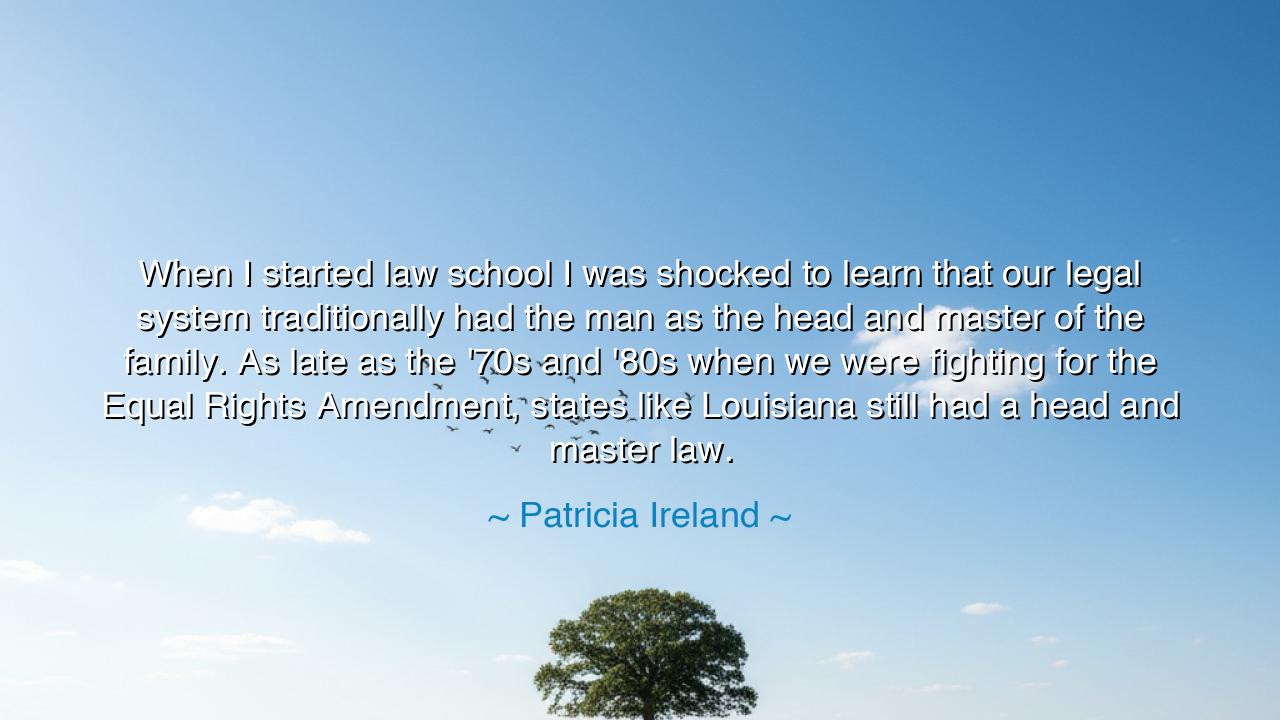
When I started law school I was shocked to learn that our legal
When I started law school I was shocked to learn that our legal system traditionally had the man as the head and master of the family. As late as the '70s and '80s when we were fighting for the Equal Rights Amendment, states like Louisiana still had a head and master law.






When Patricia Ireland spoke the words, “When I started law school I was shocked to learn that our legal system traditionally had the man as the head and master of the family. As late as the '70s and '80s when we were fighting for the Equal Rights Amendment, states like Louisiana still had a head and master law,” she tore away the veil of modern complacency and revealed the ancient shadow still lingering over the laws of humankind. In her voice was both outrage and awakening — the cry of one who has seen that even in the so-called age of progress, inequality still hid behind the pillars of legality. Her words remind us that law is not always synonymous with justice, and that the progress of civilization depends upon those who dare to confront its oldest injustices.
In the tradition of the ancients, her realization is akin to a philosopher stepping out of the cave and beholding the truth for the first time. The “head and master” laws she discovered were relics of an older world, a world that believed authority flowed only through the man, and that the woman’s duty was to submit. Under these laws, a husband controlled property, finances, and even the choices of his wife. The family, that sacred unit of human life, was constructed as a small kingdom — and woman, though the keeper of its heart, was treated as a subject, not a sovereign. Patricia Ireland, standing in the halls of law school, felt the chill of this legacy and saw that the path to equality must pass not only through hearts, but through statutes and systems.
It is difficult to imagine that such ideas persisted into the 1970s and 1980s, when humanity had already walked upon the moon and spoken of universal rights. Yet, as Ireland noted, in states like Louisiana, the “head and master” law still bound women to male authority, even as society celebrated modern freedom. The Equal Rights Amendment (ERA) became the battlefield where this ancient inequality met its challengers — women and men who sought to make equality not just a principle whispered in classrooms, but a law engraved into the foundation of the Republic. Their struggle was not merely political; it was spiritual — the reclaiming of dignity from centuries of submission.
The story of these reformers echoes the revolts of old — of those who dared to question the gods of their age. Just as Pericles once expanded the voice of democracy in Athens, and Mary Wollstonecraft demanded that reason and virtue belong equally to women, Patricia Ireland and her peers stood against the tide of complacency. They knew that freedom delayed is freedom denied, and that a society cannot truly rise when half its people are held below the threshold of power. Their struggle was not for privilege, but for balance — for the justice that recognizes both man and woman as co-architects of the human world.
Let us not forget the courage it takes to confront the hidden injustices that wear the robes of tradition. The head and master laws were defended not by villains, but by ordinary people who called them “natural,” who said, “this is how it has always been.” Yet, as Ireland’s awakening shows, morality must grow beyond memory. The measure of civilization is not how faithfully it preserves its customs, but how bravely it corrects them. To question what has long been accepted — that is the first act of liberation.
And so, from her revelation comes a timeless lesson: laws must evolve with conscience, and conscience must never rest. The march toward equality is not a single battle but a continuous journey, for even the most enlightened age can harbor unseen chains. The words of Patricia Ireland are a torch handed down through generations — a reminder that even in the late hours of history, injustice may still whisper in the language of law.
Therefore, let the listener take heed: when you see imbalance, do not turn away. When you hear the quiet justifications of inequality, answer them with courage and truth. For every home, every institution, every nation must be “settled on a basis of justice,” as the wise have said before. Equality is not a gift granted by law; it is the rightful inheritance of every human soul — and it is up to each of us to make the law worthy of that truth.






AAdministratorAdministrator
Welcome, honored guests. Please leave a comment, we will respond soon